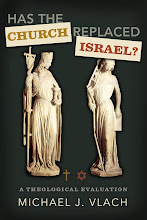
How does the Church relate to Israel? The question has been a perennial one ever since Jewish Christians believers began sharing their faith with fellow Jews (Acts 1–5). It became more of an issue when Jewish Christians were persecuted, denounced, expelled from synagogues, and even cursed as “heretics” by Jewish leaders (John 9:22; 12:42; 16:2; 2 Cor 11:24; Acts 8:1-3; 11:19; 12:1; Rev 2:9; Justin, Dial. Tryph. 16, 93, 95, 96, 123, 133). Christians who had been treated so might naturally ask, “Are we really one of them?” and “Are they really one of us?” It was the degree of continuity and discontinuity between Israel and the Church, between Law and Gospel, and between Christ and Moses, that provided the catalyst for the theological and sociological chemistry of the early Christian movement. The debates that the Jewish Christian apostle Paul had with other Jewish Christians in Antioch and Galatia was stimulated by this very question: Is Jesus merely an add on to the Mosaic covenant? What is precisely new in the new covenant?[1] Historically speaking, the church began as a renewal movement within Judaism prior to 70 AD, but after 70 AD it became a religious institution that had “parted ways” with common Judaism with a distinguishable set of beliefs and structures. What is more, Marcion’s program of trying to de-judaize Christianity led many of the Church Father’s to think through the Israelite ancestry of their faith and to ponder how to relate to the Jewish people as members of the Roman Empire. Much later, Reformed theology, with its penchant for “covenant” as the organic unity across the Bible, placed emphasis on the single and continuos plan for salvation that God had for his people. The problem was that it led to a view of supersession whereby the church had effectively replaced Israel as God’s people. A supersessionist theology combined with European anti-semitism, were intellectual forces that contributed to the Holocaust in the mid-20th century.
Christians have traditionally regarded the church as the “true Israel,” “spiritual Israel,” or “new Israel”. For example, Justin Martyr informed a Jew named Trypho that Christians “are the true Israelite race, the spiritual one, that of Judah and Jacob and Abraham” (Dial. Tryph. 11.5). Martin Luther declared that: “[T]he Jews are no longer Israel, for all things are to be new, and Israel must become new. Those alone are the true Israel who have accepted the new covenant, which was established and begun in Jerusalem.”[2] Karl Barth wrote that, “The Church is the historical successor to Israel.”[3] This perspective, whereby the church assumes the role, position, and blessings of Israel, has been questioned on two fronts. First, dispensational theology has traditionally made a distinction between the church and Israel. Ryrie went so far as to say that such a distinction was one of the essential elements of dispensational theology.[4] In progressive dispensationalism, however, the distinction is less prominent. In progressive dispensationalism, the Israel-church distinction is primarily a distinction between: (1) the dispensation of Israel, in which divine blessings were poured upon the nation, while the the Gentiles were alienated or subordinated; and (2) the present dispensation of the the church, where divine blessings are given to Jews and Gentiles, while national blessings are in abeyance. Accordingly: “Israel and the nations on the one hand and the church on the other are neither replacement peoples nor parallel, dual-track peoples but different redemptive dimensions of the same humanity.”[5] Yet Bock and Blaising still maintain that: “It is crucial to understand that promises made to Irsael are to be fulfilled by Israel and not in something reconstituted to take its place,”[6] and therein remains the point of contention. These contentions remains because Reformed theology has affirmed that the church inherits the promises given to Israel, be they redemptive, spiritual, or national. Second, several Pauline scholars insist that Paul regarded Jesus as Savior only for Gentiles and not for the Jews. The Jews are “saved” in their own Sonderweg (“special way”) under the terms of the Mosaic covenant. As such, Paul envisaged Israel as a continuing entity with her own set of privileges and blessing that was still available for them. The role of Jesus was to bring Gentiles into this heritage of Israel and Israel’s only problem was those who denied that Jesus was the instrument to redeem the Gentiles. [7] One scholar writes: “Paul nowhere addresses his churches as Israel. Nor does he transfer to them Israel’s distinctive attributes.”[8] In which case, the church is not “Israel” – a replacement theology that gave rise to anti-semitism – instead, the church is a religious philosophy or collegia within the Roman world, built on a hybrid of Jewish-Hellenistic beliefs and values.
[1] Cf. Michael F. Bird, “New Testament Theology Reloaded: Integrating Biblical Theology and Christian Origins,” Tyndale Bulletin 60 (2009): 161-87.
[2] Martin Luther, LW 35: 287-88.
[3] Barth, CD 2/3:290.
[4] Ryrie, Dispensationalism Today, 47.
[5] Darrell L. Bock and Craig A. Blaising, “Conclusion,” in Dispensationalism, Israel and the Church (Grand Rapids, MI: Zondervan, 1992), 383-84 (377-94).
[6] Bock and Blaising, “Conclusion,” 392.
[7] Cf. John Gager, Reinventing Paul (Oxford: OUP, 2000); Eung Chun Park, Either Jew or Gentile: Paul’s Unfolding Theology of Inclusivity (Louisville, KY: Westminster John Knox, 2003).
[8] John Gager, The Origins of Anti-Semitism (New York: OUP, 1983), 228.















